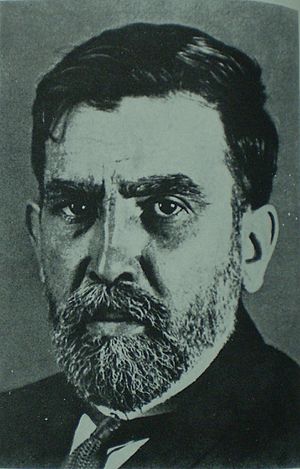Rogelio Yrurtia facts for kids
Rogelio Yrurtia (born December 6, 1879 – died March 4, 1950) was a famous Argentine sculptor. He was known for his art style called Realism, which means his sculptures looked very much like real life.
Contents
The Life of Rogelio Yrurtia
Early Life and Art Training
Rogelio Yrurtia was born in Buenos Aires, Argentina, in 1879. His parents were immigrants from the Basque region. In 1899, he joined the local Society for the Promotion of Fine Arts. He was a very talented student.
Because of his talent, he quickly won a scholarship. This allowed him to travel to Paris, France. In Paris, he studied at the famous Académie Julien. He learned from a great teacher named Jules-Felix Coutan.
First Exhibitions and Awards
Yrurtia had his first art show in 1903. It was at the National Society of French Artists. He also won a big award in 1904. This was at the Louisiana Purchase Exposition in St. Louis, Missouri, in the United States.
Returning to Argentina and New Projects
Yrurtia came back to Buenos Aires in 1905. He showed his art in many exhibitions. In 1907, he was asked to create a monument. This monument was for Manuel Dorrego, an important Argentine leader from the 1820s.
Later, he moved to Barcelona, Spain. His work there won him another Grand Prize in 1911. This was at the International Arts Exposition.
When he returned to Buenos Aires in 1916, he got another important job. He was asked to sculpt a statue of Bernardino Rivadavia. Rivadavia was the first constitutional President of Argentina. This statue was for a special tomb, called a mausoleum. It was planned for Plaza Miserere.
Famous Sculptures and Later Years
Rogelio Yrurtia kept showing his art successfully. He had exhibitions in Argentina and other countries. The city of Buenos Aires asked him to create a large monument. It was for a plaza along Paseo Colón, a big street.
This monument was called Ode to Labour. It was finished in 1927. This is considered his most important work. Many people still know it today.
A rich businessman named Carlos Delcasse asked Yrurtia to create a sculpture for his family tomb. This was in Vicente López. Yrurtia finished it in 1936. The most important part of this work was a sculpture called Justice.
In 1937, Yrurtia created a sculpture called Moses. It was for the opening of the Juan B. Castagnino Fine Arts Museum in Rosario. In 1938, he became one of the first members of the National Academy of Fine Arts.
He continued to create art from his home in Belgrano. Rogelio Yrurtia passed away in 1950. He left his home to be a museum. One of his last sculptures, The Boxers, is in the museum's courtyard.
Images for kids
See also
 In Spanish: Rogelio Yrurtia para niños
In Spanish: Rogelio Yrurtia para niños
 | Ernest Everett Just |
 | Mary Jackson |
 | Emmett Chappelle |
 | Marie Maynard Daly |



